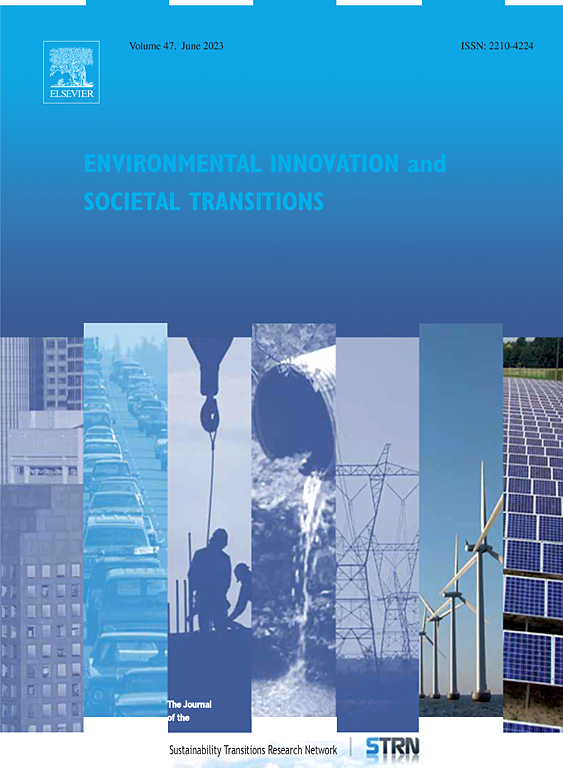公共客户为可持续转型的创新创造领先市场:瑞典建筑行业的市场塑造
IF 6.1
2区 经济学
Q1 ENVIRONMENTAL SCIENCES
Environmental Innovation and Societal Transitions
Pub Date : 2025-09-06
DOI:10.1016/j.eist.2025.101046
引用次数: 0
摘要
公众需求被强调为解决社会转型的环境创新的主要驱动力。2007年,欧盟委员会通过了“主导市场倡议”,以应对几个工业部门的重大社会挑战,其中建筑业对可持续发展的影响最大。为了研究公共客户如何为建筑环境创新创造领先市场,我们以最近的进展为基础,强调市场塑造战略对社会转型至关重要。本文研究了公共建筑客户如何主动使用并结合市场塑造策略来创造环境创新的领先市场。通过对瑞典三家公共建筑客户的多案例研究,我们的实证发现说明了客户如何使用和结合与七组领先市场优势相关的广泛的市场塑造策略。我们对市场塑造和主导市场文献进行了交叉分析,并展示了市场塑造策略如何在实现组合效应中相互作用,从而激励主导市场的创建,以实现可持续转型的环境创新。本文章由计算机程序翻译,如有差异,请以英文原文为准。
Public clients creating lead markets for innovation towards sustainability transitions: Market-shaping in the Swedish construction sector
Public demand is emphasized as a major driving force for environmental innovation addressing societal transitions. In 2007, the European Commission adopted the ‘lead market initiative’ to tackle grand societal challenges across several industrial sectors, of which construction has the greatest sustainability impact. To study how public clients can create lead markets for environmental innovation in construction, we build on recent advancements emphasizing market-shaping strategies as critical for societal transitions. The paper investigates how public construction clients proactively use and combine market-shaping strategies to create lead markets for environmental innovations. Our empirical findings, from a multiple-case study of three public construction clients in Sweden, illustrate how the clients use and combine a broad range of market-shaping strategies related to seven groups of lead market advantages. We contribute to theory by cross-fertilizing market-shaping and lead market literatures and showing how market-shaping strategies interplay in achieving combinatory effects, which incentivize creation of lead markets for environmental innovation towards sustainability transitions.
求助全文
通过发布文献求助,成功后即可免费获取论文全文。
去求助
来源期刊

Environmental Innovation and Societal Transitions
Energy-Renewable Energy, Sustainability and the Environment
CiteScore
13.60
自引率
19.40%
发文量
90
审稿时长
56 days
期刊介绍:
Environmental Innovation and Societal Transitions serves as a platform for reporting studies on innovations and socio-economic transitions aimed at fostering an environmentally sustainable economy, thereby addressing structural resource scarcity and environmental challenges, particularly those associated with fossil energy use and climate change. The journal focuses on various forms of innovation, including technological, organizational, economic, institutional, and political, as well as economy-wide and sectoral changes in areas such as energy, transport, agriculture, and water management. It endeavors to tackle complex questions concerning social, economic, behavioral-psychological, and political barriers and opportunities, along with their intricate interactions. With a multidisciplinary approach and methodological openness, the journal welcomes contributions from a wide array of disciplines within the social, environmental, and innovation sciences.
 求助内容:
求助内容: 应助结果提醒方式:
应助结果提醒方式:


